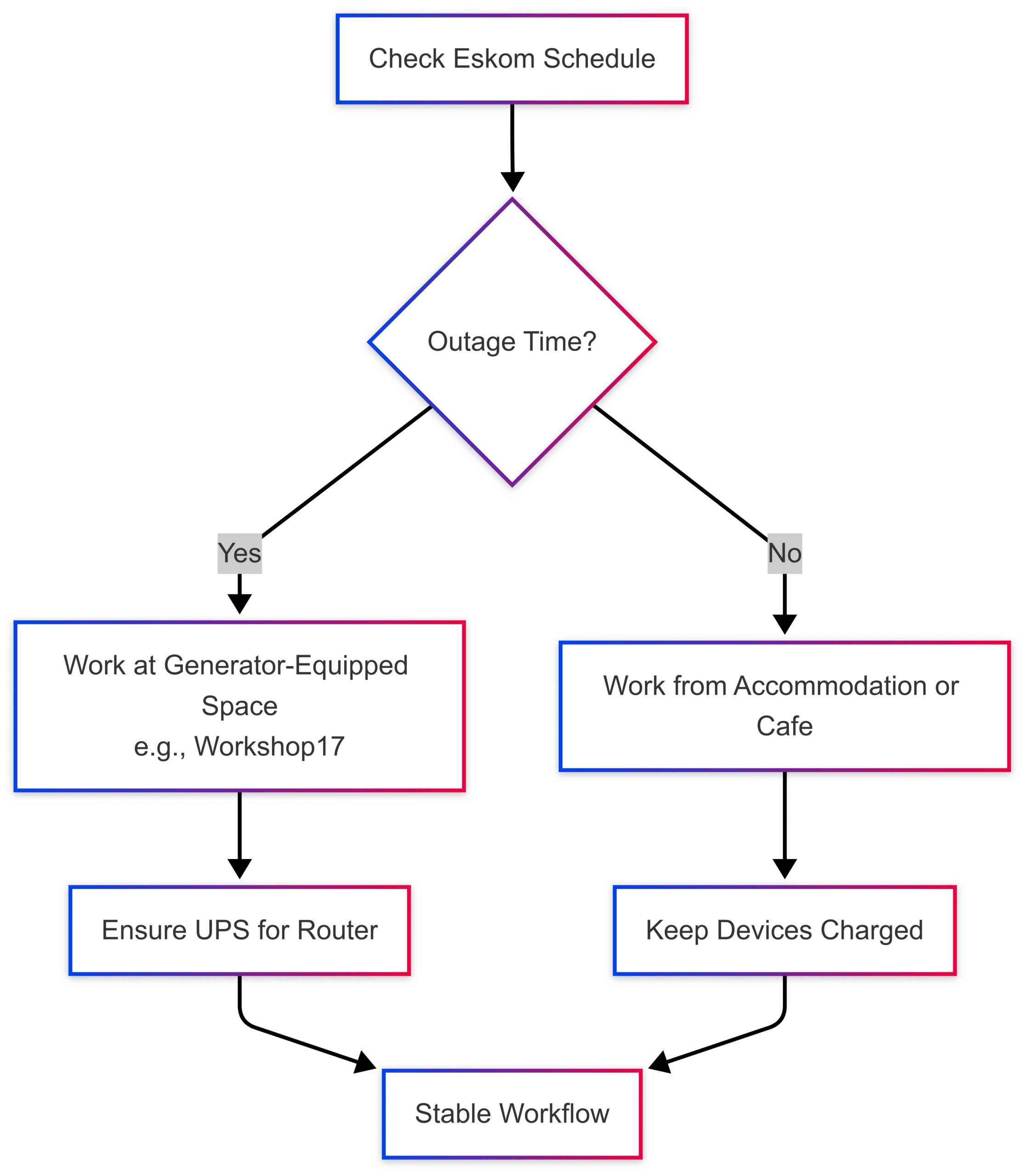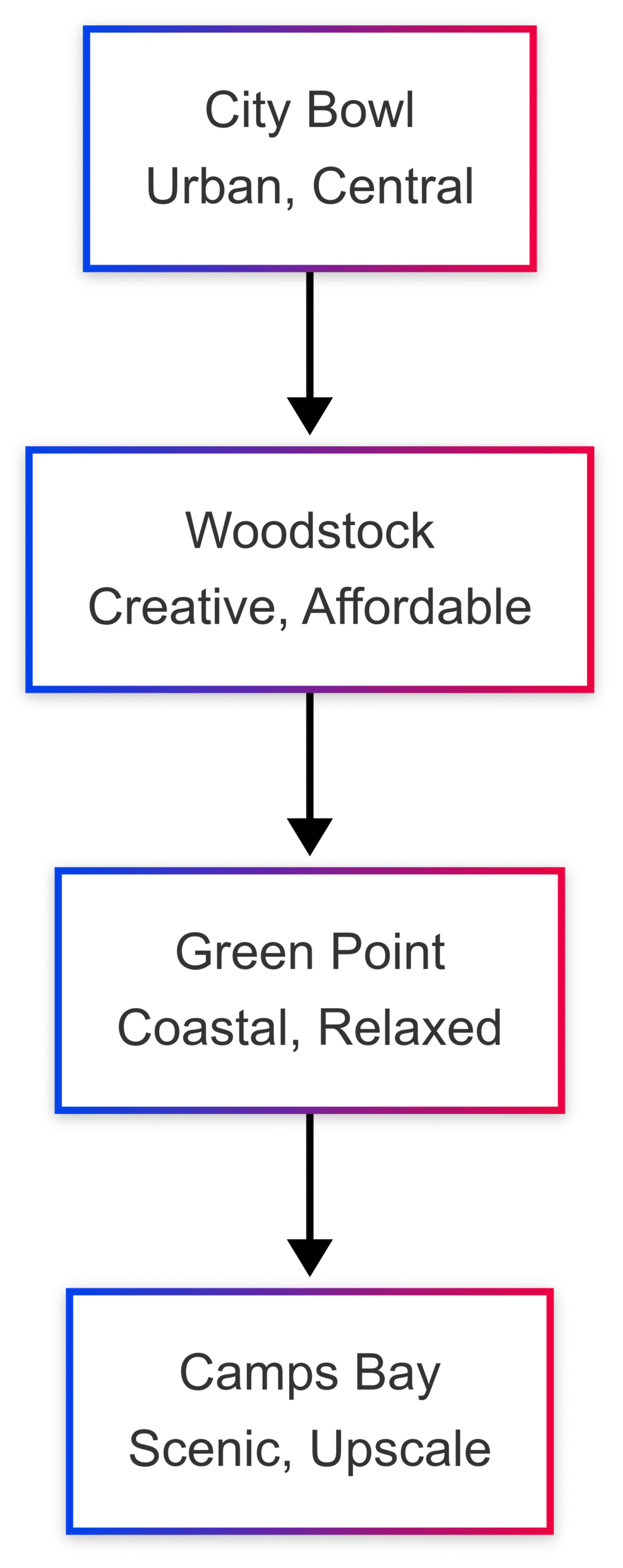Discover why Cape Town is a top destination for digital nomads with affordable living, vibrant culture, and reliable workspaces. Plan your nomad journey now!
Cape Town, South Africa, is a beacon for digital nomads seeking a blend of stunning natural beauty, vibrant culture, and a cost-effective lifestyle. Nestled between the iconic Table Mountain and the Atlantic Ocean, this city offers an unparalleled backdrop for remote work. From its thriving coworking scene to its diverse neighborhoods, Cape Town has become a hotspot for those embracing the nomad lifestyle. This guide dives deep into what makes Cape Town an ideal destination for digital nomads, covering everything from cost of living and internet connectivity to safety tips and the best places to work and socialize.
Why Choose Cape Town for Your Digital Nomad Journey?
Cape Town stands out as a premier destination for digital nomads due to its unique combination of affordability, connectivity, and lifestyle. The city boasts a relatively low cost of living compared to Western capitals, making it an attractive option for those earning in stronger currencies like USD, EUR, or GBP. Its cultural diversity, vibrant arts scene, and proximity to natural wonders like Table Mountain and the Cape Winelands create an environment that balances work and adventure. Whether you’re a software engineer, content creator, or freelancer, Cape Town offers the infrastructure and community to support your remote work lifestyle.
Key Highlights
- Affordability: Monthly living costs range from $1,500 to $2,600, including accommodation, food, and entertainment.
- Connectivity: Reliable internet with average speeds of 26.47 Mbps download and 20.68 Mbps upload in urban areas.
- Community: A thriving digital nomad scene with meetups, coworking spaces, and social events.
- Lifestyle: Access to beaches, hiking trails, and a bustling nightlife centered around Long Street.
- Challenges: Load-shedding (planned power outages) and safety concerns require proactive planning.
Cost of Living: Budgeting for a Month in Cape Town
Cape Town offers a cost-effective lifestyle, particularly for digital nomads earning in foreign currencies. Below is a detailed breakdown of typical monthly expenses for a single adult living comfortably in the city.
| Category | Cost (USD) | Notes |
|---|---|---|
| Accommodation (1-bedroom apartment, city center) | $500–$1,000 | Varies by neighborhood; Green Point and City Bowl are pricier. |
| Hostel Dorm (per night) | $10–$20 | Affordable option for short-term stays; check Hostelworld for deals. |
| Hotel Room (mid-range, per night) | $50–$100 | Convenient for short stays; includes breakfast at places like Sky Hotel. |
| Food (groceries & dining out) | $300–$500 | Mid-range restaurants cost $10–$20 per meal; a latte is $2–$3. |
| Local Transport (one-way ticket) | $0.50–$1 | Buses and trains are affordable; Uber is widely used. |
| Monthly Gym Membership | $20–$50 | Virgin Active offers nationwide access for $110–$195/month. |
| Data Plan (monthly) | $10–$20 | Airalo eSIM recommended for reliable mobile data. |
| Coworking Space (monthly) | $50–$150 | Workshop17 and Ideas Cartel offer premium facilities. |
| Entertainment & Miscellaneous | $200–$400 | Includes nightlife, tours (e.g., Viator), and wine tram experiences. |
| Total (Comfortable Lifestyle) | $1,500–$2,600 | Add 30% buffer for unexpected expenses like load-shedding workarounds. |
Budgeting Tips
- Accommodation: Opt for hostels like Never@Home ($14/night for dorms) or Atlantic Point Backpackers ($15/night) for budget-friendly stays. For longer stays, Airbnb or furnished apartments in Woodstock or Green Point offer better value.
- Food: Cook at home to save on groceries, but don’t miss out on local favorites like Nando’s Chicken or Ethiopian cuisine at Madam Taitou.
- Transport: Use Uber for safety, especially at night. Walking is viable in safer areas like Green Point, Sea Point, and Camps Bay.
- Data Plans: Airalo’s eSIM provides affordable, reliable mobile data, crucial during load-shedding.
Internet Connectivity: Staying Online in Cape Town
Reliable internet is a cornerstone of the digital nomad lifestyle, and Cape Town delivers solid connectivity in most urban areas. Based on extensive testing, the average internet speeds in the city are:
- Download Speed: 26.47 Mbps
- Upload Speed: 20.68 Mbps
- Latency: 44.7 ms
These speeds are sufficient for video calls, coding, and most remote work tasks. However, performance varies by location and provider. Below is a table summarizing Wi-Fi speeds at popular digital nomad spots:
| Location | Type | Download (Mbps) | Upload (Mbps) | Latency (ms) |
|---|---|---|---|---|
| Workshop17 (Waterfront) | Coworking Space | 110.54 | 39.19 | 29 |
| Shift Espresso (Glengariff) | Cafe | 96.76 | 94.43 | 29 |
| Atlantic Point Backpackers | Hostel | 93.22 | 84.30 | 28 |
| Hotel Sky (Lobby) | Hotel | 64.37 | 45.58 | 24 |
| Never@Home (Green Point) | Hostel | 27.14 | 27.34 | 24 |
| Solis Hotspot | Mobile Hotspot | 23.93 | 5.07 | 77 |
| Bootlegger Coffee (Green Point) | Cafe | 7.34 | 7.02 | 62 |
Internet Tips
- Coworking Spaces: Workshop17 at the Waterfront offers the fastest Wi-Fi, ideal for bandwidth-heavy tasks like software development.
- Cafes: Shift Espresso in Sea Point provides near-coworking-level speeds, making it a great alternative for casual workdays.
- Backup Options: Invest in a Solis Hotspot or Airalo eSIM for reliable mobile data during load-shedding or when working remotely.
- Load-Shedding Workaround: Choose accommodations or workspaces with backup generators to ensure uninterrupted connectivity.
Chart: Internet Speed Comparison

This chart visualizes the download speeds across key digital nomad workspaces, with Workshop17 leading the pack.
Navigating Load-Shedding: Cape Town’s Power Challenge
Load-shedding, or planned power outages, is a significant challenge for digital nomads in Cape Town. Managed by Eskom, these outages occur 1–2 times weekly, lasting 2–4 hours, to balance the national power grid. For remote workers, this can disrupt workflows, especially for tasks requiring stable internet.
Strategies to Manage Load-Shedding
- Check Schedules: Monitor Eskom’s load-shedding schedule online to plan your workday.
- Backup Power: Invest in a UPS (Uninterruptible Power Supply) for your router to maintain Wi-Fi for 2–3 hours during outages.
- Choose Generator-Equipped Spaces: Hotels like Sky Hotel and coworking spaces like Workshop17 have backup generators, ensuring uninterrupted work.
- Keep Devices Charged: Always keep your laptop and phone fully charged to bridge power gaps.
- Adapt and Plan: Schedule high-priority tasks outside load-shedding hours and use cafes or coworking spaces during outages.
Example Workflow During Load-Shedding

This flowchart outlines a practical approach to maintaining productivity during load-shedding.
Safety Considerations for Digital Nomads
Cape Town is vibrant but requires vigilance due to its safety challenges, particularly in certain areas. While neighborhoods like Green Point, Sea Point, and Camps Bay are relatively safe, petty crime like pickpocketing can occur, especially in the Central Business District (CBD).
Safety Tips
- Daytime Safety: Stick to well-populated areas like the Waterfront or Green Point for daytime walks.
- Nighttime Travel: Use Uber for all nighttime travel to avoid walking in poorly lit areas.
- Valuables: Keep laptops and phones secure; avoid flashy jewelry or leaving items unattended in public spaces.
- Community Advice: Connect with locals or digital nomad groups (e.g., Cape Town Digital Nomads on Facebook) for real-time safety tips.
- Solo Travelers: Female nomads should avoid solo hikes and always watch drinks at bars.
By staying aware and using common-sense precautions, you can enjoy Cape Town’s offerings safely.
Best Neighborhoods for Digital Nomads
Cape Town’s neighborhoods cater to different nomad preferences, from creative hubs to serene coastal areas. Here are the top picks:
City Bowl
- Pros: Central location, easy access to coworking spaces (e.g., Workshop17), cultural attractions, and nightlife on Long Street.
- Cons: Higher rental costs ($700–$1,000/month for a 1-bedroom).
- Best For: Nomads seeking urban vibrancy and convenience.
Woodstock
- Pros: Creative vibe with art galleries, cafes (e.g., Bootlegger Coffee), and affordable rentals ($500–$800/month).
- Cons: Some areas can feel less safe; check accommodation reviews.
- Best For: Artists and freelancers who thrive in eclectic settings.
Green Point
- Pros: Relaxed atmosphere, close to the Waterfront, and reliable Wi-Fi at spots like Shift Espresso.
- Cons: Slightly pricier ($600–$900/month for apartments).
- Best For: Nomads wanting a balance of coastal charm and city access.
Camps Bay
- Pros: Stunning beach views, upscale vibe, and proximity to hiking trails.
- Cons: Expensive rentals ($800–$1,200/month) and farther from coworking hubs.
- Best For: Nomads prioritizing scenic beauty and luxury.
Chart: Neighborhood Comparison

This chart highlights the distinct vibes of each neighborhood, helping nomads choose based on priorities.
Where to Work: Coworking Spaces and Cafes
Cape Town’s coworking spaces and cafes cater to digital nomads with reliable Wi-Fi, ample outlets, and inspiring environments.
Top Coworking Spaces
- Workshop17 (Waterfront)
- Cost: $125/month or $20/day pass.
- Features: Fastest Wi-Fi (110.54 Mbps), backup generators, and modern facilities.
- Best For: Software engineers needing high-speed internet.
- Ideas Cartel
- Cost: $100–$150/month.
- Features: Stylish design, networking events, and central locations.
- Best For: Creatives and entrepreneurs.
- House Of
- Cost: $80–$120/month.
- Features: Community-focused with affordable rates.
- Best For: Budget-conscious nomads.
Top Cafes
- Bootlegger Coffee (Green Point)
- Wi-Fi: 7.34 Mbps download, suitable for light tasks.
- Ambiance: Open-air, shaded, with friendly staff.
- Cost: Latte at $2–$3.
- Best For: Casual workdays with good food.
- Shift Espresso (Glengariff, Sea Point)
- Wi-Fi: 96.76 Mbps download, ideal for video calls.
- Ambiance: Modern design, ample outlets.
- Cost: Meals at $10–$15.
- Best For: High-productivity days.
Choosing a Workspace
- Test Before Committing: Visit coworking spaces or cafes for a day to check Wi-Fi and noise levels.
- Budget Considerations: Cafes are cheaper for short-term work, while coworking spaces offer better amenities for long-term stays.
- Load-Shedding: Prioritize spaces with generators for uninterrupted work.
Socializing and Building Community
Cape Town’s digital nomad community is vibrant, with numerous opportunities to connect. The city scores 4.5/5 for ease of making friends due to its welcoming atmosphere and active nomad groups.
Ways to Connect
- Nomadlist: Join the Cape Town group to meet other nomads for coworking or social events.
- Facebook Groups: Search for “Cape Town Digital Nomads” to find local meetups and WhatsApp group links.
- Hostels: Never@Home and Atlantic Point Backpackers foster community with shared spaces like pools and bars.
- Meetup Events: Regular digital nomad meetups occur at venues like Long Street bars or Workshop17.
Nightlife Hotspots
- Long Street: The epicenter of Cape Town’s nightlife with bars, clubs, and street events.
- The Gin Bar: A hidden gem with a great selection and relaxed vibe.
- Culture Wine Bar: Ideal for wine lovers seeking a sophisticated evening.
Where to Stay: Hotels and Hostels
Cape Town offers a range of accommodations tailored to digital nomads, from budget hostels to mid-range hotels.
Top Picks
- Sky Hotel (Long Street)
- Cost: $45/night (includes breakfast buffet).
- Wi-Fi: 45.57 Mbps download in the lobby; suitable for video calls.
- Features: Backup generators, rooftop views, and air conditioning.
- Community: 2/5; better for couples or families.
- Best For: Nomads needing reliable Wi-Fi and comfort.
- Never@Home (Green Point)
- Cost: $14/night (dorm) or $40/night (private room).
- Wi-Fi: 27.14 Mbps; sufficient near the front desk but noisy at night.
- Features: Pool, bar, and vibrant community vibe.
- Community: 5/5; great for solo travelers.
- Best For: Social nomads on a budget.
- Atlantic Point Backpackers (Green Point)
- Cost: $15/night (dorm) or $65/night (private room).
- Wi-Fi: 93.22 Mbps; excellent for video calls.
- Features: Chill atmosphere, close to cafes and the Waterfront.
- Community: 5/5; friendly common areas.
- Cons: No air conditioning; minor maintenance issues.
- Best For: Nomads prioritizing fast Wi-Fi and community.
Visa Requirements for Digital Nomads
South Africa’s visa policies depend on your nationality and length of stay:
- Tourist Visa: Many nationalities (e.g., USA, EU) can enter visa-free for 90 days. Extensions up to 6 months are possible but require application.
- Digital Nomad Visa: South Africa introduced a digital nomad visa in 2024, allowing remote workers to stay for up to 6 months without local employment. Check the South African embassy website for eligibility and requirements.
- Tips: Apply for visas well in advance and carry proof of remote work (e.g., employment contract) to avoid issues.
Exploring Cape Town: Lifestyle and Activities
Cape Town’s lifestyle is a major draw for digital nomads. Beyond work, the city offers endless opportunities for adventure and relaxation.
Outdoor Activities
- Hiking: Table Mountain and Lion’s Head offer stunning trails. Use AllTrails for route planning.
- Beaches: Camps Bay and Clifton beaches are perfect for a post-work dip.
- Wine Tours: Visit Franschhoek’s wine tram or Constantia Glen for a taste of Cape Winelands.
Food and Dining
- Nando’s Chicken: Fast, affordable rotisserie chicken ($10–$15/meal).
- Madam Taitou: Authentic Ethiopian cuisine near Long Street.
- Bootlegger Coffee: Great breakfast options in Green Point.
Exercise
- Virgin Active: Gym memberships range from $110–$195/month, with premium locations in Cape Town.
- Outdoor Workouts: Join local running or yoga groups at Green Point Park.
Final Thoughts: Is Cape Town Right for You?
Cape Town is a digital nomad’s dream, blending affordability, connectivity, and a vibrant lifestyle. While challenges like load-shedding and safety require preparation, the city’s coworking spaces, welcoming community, and stunning landscapes make it worth the effort. Whether you’re coding from a cafe in Green Point, hiking Table Mountain, or sipping wine in Franschhoek, Cape Town offers a dynamic environment to work, live, and explore.
Plan your stay with these tips, connect with the nomad community, and embrace the adventure. Cape Town isn’t just a destination—it’s a lifestyle that will inspire your work and wanderlust.
Please share this Living the nomad life in Cape Town, South Africa with your friends and do a comment below about your feedback.
We will meet you on next article.
Until you can read, Adjusting to New Customer Behaviours of the Hybrid Travel Culture
